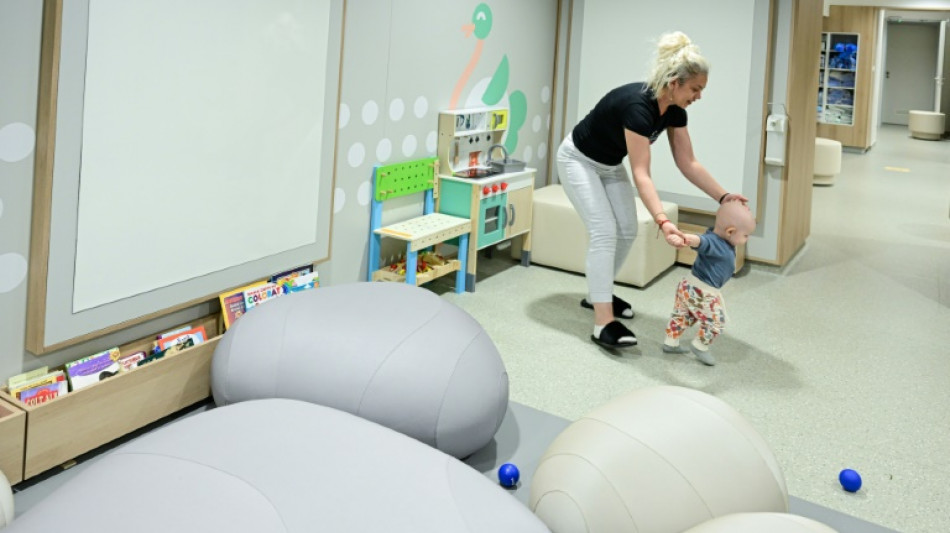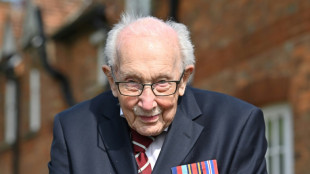

Romania opens first crowd-funded hospital
At Romania's new crowd-funded children's cancer hospital, one-year-old Eric Ivan eagerly walked up and down the corridor, his mother holding his hands to steady him.
The bright, attractive building is a far cry from the drab facilities next door -- and stands out as the first hospital in Romania financed exclusively through donations.
No less than 350,000 people and almost 8,000 companies contributed to it with the drive led by a civil group, frustrated by the inadequate facilities in the EU country with the lowest public spending on health.
"Romanians just need things to believe in," said Oana Gheorghiu, who co-founded the Give Life Association that collected the money.
For Carmen Uscatu, the group's other co-founder, the new hospital is proof that "anything is possible".
- 'Radical change' -
Out of the total raised, some 20 million euros came from two- and four-euro text messages, according to Give Life.
The new facility is a "slap in the face of politicians who didn't want and couldn't do anything for healthcare in this country", actor and musician Tudor Chirila, one of its donors, wrote on Facebook.
Founded in 2012, Give Life helps build health infrastructure throughout the country.
The Bucharest project was born in 2015 when the two women saw children with cancer and their families queueing outside a single toilet in the Marie Curie state hospital.
At first, the idea was just to modernise the oncology wards, but the project expanded into constructing a completely new building next to the old one.
Eric, diagnosed last year with neuroblastoma, started his treatment in the old hospital building before moving to the new one for his chemotherapy.
For Eric's mom, 41-year-old Ildiz Ivan, this was a "radical change" from where she had had to take Eric for treatment before.
"He has more space to run around, to play," she told AFP, seated in a bright playroom equipped with bouncy balls and a play kitchen.
"If it weren't for the doctors and nurses, I'd feel right at home."
With a capacity of 140 beds, the new building includes oncology, haemato-oncology, surgery, intensive care and neurosurgery units. It also has playrooms, a cinema, a radio studio and even an observatory on the roof.
And the Give Life organisation donated the whole facility to the state.
Haematologist Madalina Schmidt was among the doctors welcoming the new hospital. The conditions there were "much better", she said.
And because the children and their parents are happier, interactions between the doctors and their patients are also easier, said Schmidt, 49, who moved to Bucharest from the eastern city of Iasi this year to work in the new facility.
- Far from done -
Since 2015, Romania -- besieged by political instability -- has had no less than 12 health ministers.
"Incompetence, lack of vision, and at times corruption" have infected the state health-care system, said Gheorghiu.
In 2020, the nation of 19 million people had the lowest average health expenditure per inhabitant in the EU, according to the latest Eurostat data.
While many doctors are leaving the country, patients also have to put up with dilapidated and overcrowded hospitals.
Most of the country's hospitals were built before 1970 and "no longer meet the requirements of current regulations", a recent Court of Accounts report said.
So Gheorghiu and Uscatu are far from done.
They are already raising money for another new building to house other departments of the old hospital. They want to transform the grounds into a medical campus.
"We can't stop here," Uscatu said.
They want to bring the survival rate of children with cancer in Romania, currently 70 percent, closer to the 81-percent EU-wide average.
Uscatu wants to get to the point where parents no longer have to look abroad to get the treatment they need for their sick children.
"It's not just about a hospital, but about an entire system," Gheorghiu said.
A.D.Eastaughffe--MC-UK




